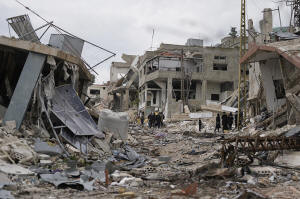22 reported killed in Lebanon before agreement to extend deadline for
Israeli forces to withdraw
 Send a link to a friend
Send a link to a friend
 [January 27, 2025]
By KAREEM CHEHAYEB and ABBY SEWELL [January 27, 2025]
By KAREEM CHEHAYEB and ABBY SEWELL
MAYS AL-JABAL, Lebanon (AP) — Israeli forces in southern Lebanon on
Sunday opened fire on protesters demanding their withdrawal in line with
a ceasefire agreement, killing at least 22 and injuring 124, Lebanese
health officials reported.
Hours later, the White House said Sunday that Israel and Lebanon had
agreed to extend the deadline for Israeli troops to depart southern
Lebanon until Feb. 18, after Israel requested more time to withdraw
beyond the 60-day deadline stipulated in a ceasefire agreement that
halted the Israel-Hezbollah war in late November.
Israel has said that it needs to stay longer because the Lebanese army
has not deployed to all areas of southern Lebanon to ensure that
Hezbollah does not reestablish its presence in the area. The Lebanese
army has said it cannot deploy until Israeli forces withdraw.
The White House said in a statement that “the arrangement between
Lebanon and Israel, monitored by the United States, will continue to be
in effect until February 18, 2025.” It added that the respective
governments “will also begin negotiations for the return of Lebanese
prisoners captured after October 7, 2023.”
There was no immediate comment from the Israeli government, but Lebanese
caretaker Prime Minister Najib Mikati confirmed the extension.

The announcement came hours after demonstrators, some of them carrying
Hezbollah flags, attempted to enter several villages to protest Israel’s
failure to withdraw from southern Lebanon by the original Sunday
deadline.
The dead included six women and a Lebanese army soldier, the Health
Ministry said in a statement. People were reported wounded in nearly 20
villages in the border area.
The Israeli army blamed Hezbollah for stirring up Sunday's protests.
It said in a statement that its troops fired warning shots to “remove
threats in a number of areas where suspects were identified
approaching.” It added that a number of suspects in proximity to Israeli
troops were apprehended and were being questioned.
The development in Lebanon comes as Israel kept thousands of
Palestinians from returning to their homes in northern Gaza on Sunday,
accusing Hamas of violating a fragile ceasefire by changing the order of
hostages it has released.
Lebanese President Joseph Aoun said in a statement addressing the people
of southern Lebanon on Sunday that “Lebanon’s sovereignty and
territorial integrity are non-negotiable, and I am following up on this
issue at the highest levels to ensure your rights and dignity.”
He urged them to “exercise self-restraint and trust in the Lebanese
Armed Forces.” The Lebanese army, in a separate statement, said it was
escorting civilians into some towns in the border area and called on
residents to follow military instructions to ensure their safety.
Parliament Speaker Nabih Berri, whose Amal Movement party is allied with
Hezbollah and who served as an interlocutor between the militant group
and the U.S. during ceasefire negotiations, said that Sunday's bloodshed
“is a clear and urgent call for the international community to act
immediately and compel Israel to withdraw from occupied Lebanese
territories.”
An Arabic-language spokesperson for the Israeli military, Avichay Adraee,
posted on X that Hezbollah had sent “rioters” and is "trying to heat up
the situation to cover up its situation and status in Lebanon and the
Arab world.”
[to top of second column]
|

Lebanese citizens check the destruction on their village caused by
the Israeli air and ground offensive, in Aita al-Shaab, a Lebanese
border village with Israel, south Lebanon, Sunday, Jan. 26, 2025.
(AP Photo/Bilal Hussein)

He called Sunday morning for residents of the border area not to
attempt to return to their villages.
U.N. Special Coordinator for Lebanon Jeanine Hennis-Plasschaert and
the head of mission of the U.N. peacekeeping force known as UNIFIL,
Lt. Gen. Aroldo Lázaro, called in a joint statement for both Israel
and Lebanon to comply with their obligations under the ceasefire
agreement.
“The fact is that the timelines envisaged in the November
Understanding have not been met,” the statement said. “As seen
tragically this morning, conditions are not yet in place for the
safe return of citizens to their villages along the Blue Line.”
UNIFIL said that further violence risks undermining the fragile
security situation in the area and "prospects for stability ushered
in by the cessation of hostilities and the formation of a government
in Lebanon.”
It called for the complete withdrawal of Israeli troops, the removal
of unauthorized weapons and assets south of the Litani River, the
redeployment of the Lebanese army in all of south Lebanon and
ensuring the safe and dignified return of displaced civilians on
both sides of the Blue Line.
An AP team was stranded overnight at a UNIFIL base near Mays al-Jabal
after the Israeli army erected roadblocks Saturday while they were
joining a patrol by peacekeepers. The journalists reported hearing
gunshots and booming sounds Sunday morning from the base, and
peacekeepers said that dozens of protesters had gathered nearby.
In the village of Aita al Shaab, families wandered over flattened
concrete structures looking for remnants of the homes they left
behind. No Israeli forces were present.
“These are our houses,” said Hussein Bajouk, one of the returning
residents. “However much they destroy, we will rebuild.”
Bajouk added that he is convinced that former Hezbollah leader
Hassan Nasrallah, who was killed in an Israeli strike in Beirut’s
southern suburbs in September, is really still alive.
“I don’t know how much we’re going to wait, another month or two
months... but the Sayyed will come out and speak,” he said using an
honorific for Nasrallah.

On the other side of the border in the kibbutz of Manara, Orna
Weinberg surveyed the devastation of the recent conflict on her
neighbors and the Lebanese villages on the other side of the
frontier. The sound of gunfire sporadically popped in the distance.
“Unfortunately, we have no way of defending our own children without
harming their children," Weinberg, 58, said. "It’s a tragedy to all
sides.”
Some 112,000 Lebanese remain displaced, out of over 1 million who
fled their homes during the war.
___
Sewell reported from Beirut. Associated Press writers Zeke Miller in
Washington, Sally Abou AlJoud in Beirut, Bilal Hussein in Aita al-Shaab,
Lebanon, and Sam McNeil in Manara, Israel, contributed to this
report.
All contents © copyright 2025 Associated Press. All rights reserved |